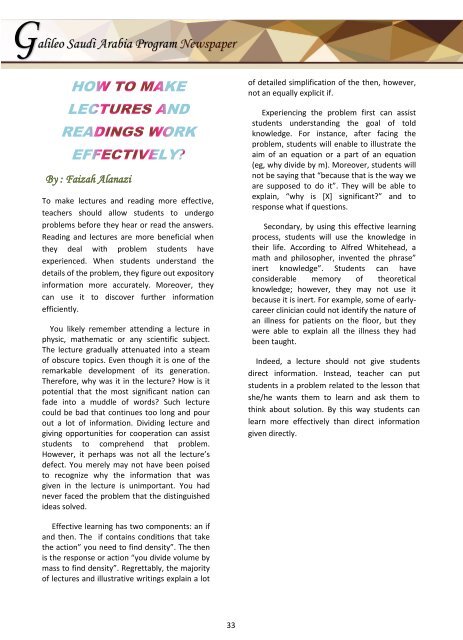Newspaper Khebrat Wave2 Oakland 2018
Create successful ePaper yourself
Turn your PDF publications into a flip-book with our unique Google optimized e-Paper software.
Galileo Saudi Arabia Program <strong>Newspaper</strong><br />
of detailed simplification of the then, however,<br />
not an equally explicit if.<br />
By : Faizah Alanazi<br />
To make lectures and reading more effective,<br />
teachers should allow students to undergo<br />
problems before they hear or read the answers.<br />
Reading and lectures are more beneficial when<br />
they deal with problem students have<br />
experienced. When students understand the<br />
details of the problem, they figure out expository<br />
information more accurately. Moreover, they<br />
can use it to discover further information<br />
efficiently.<br />
You likely remember attending a lecture in<br />
physic, mathematic or any scientific subject.<br />
The lecture gradually attenuated into a steam<br />
of obscure topics. Even though it is one of the<br />
remarkable development of its generation.<br />
Therefore, why was it in the lecture? How is it<br />
potential that the most significant nation can<br />
fade into a muddle of words? Such lecture<br />
could be bad that continues too long and pour<br />
out a lot of information. Dividing lecture and<br />
giving opportunities for cooperation can assist<br />
students to comprehend that problem.<br />
However, it perhaps was not all the lecture’s<br />
defect. You merely may not have been poised<br />
to recognize why the information that was<br />
given in the lecture is unimportant. You had<br />
never faced the problem that the distinguished<br />
ideas solved.<br />
Experiencing the problem first can assist<br />
students understanding the goal of told<br />
knowledge. For instance, after facing the<br />
problem, students will enable to illustrate the<br />
aim of an equation or a part of an equation<br />
(eg, why divide by m). Moreover, students will<br />
not be saying that “because that is the way we<br />
are supposed to do it”. They will be able to<br />
explain, “why is [X] significant?” and to<br />
response what if questions.<br />
Secondary, by using this effective learning<br />
process, students will use the knowledge in<br />
their life. According to Alfred Whitehead, a<br />
math and philosopher, invented the phrase”<br />
inert knowledge”. Students can have<br />
considerable memory of theoretical<br />
knowledge; however, they may not use it<br />
because it is inert. For example, some of earlycareer<br />
clinician could not identify the nature of<br />
an illness for patients on the floor, but they<br />
were able to explain all the illness they had<br />
been taught.<br />
Indeed, a lecture should not give students<br />
direct information. Instead, teacher can put<br />
students in a problem related to the lesson that<br />
she/he wants them to learn and ask them to<br />
think about solution. By this way students can<br />
learn more effectively than direct information<br />
given directly.<br />
Effective learning has two components: an if<br />
and then. The if contains conditions that take<br />
the action” you need to find density”. The then<br />
is the response or action “you divide volume by<br />
mass to find density”. Regrettably, the majority<br />
of lectures and illustrative writings explain a lot<br />
33


